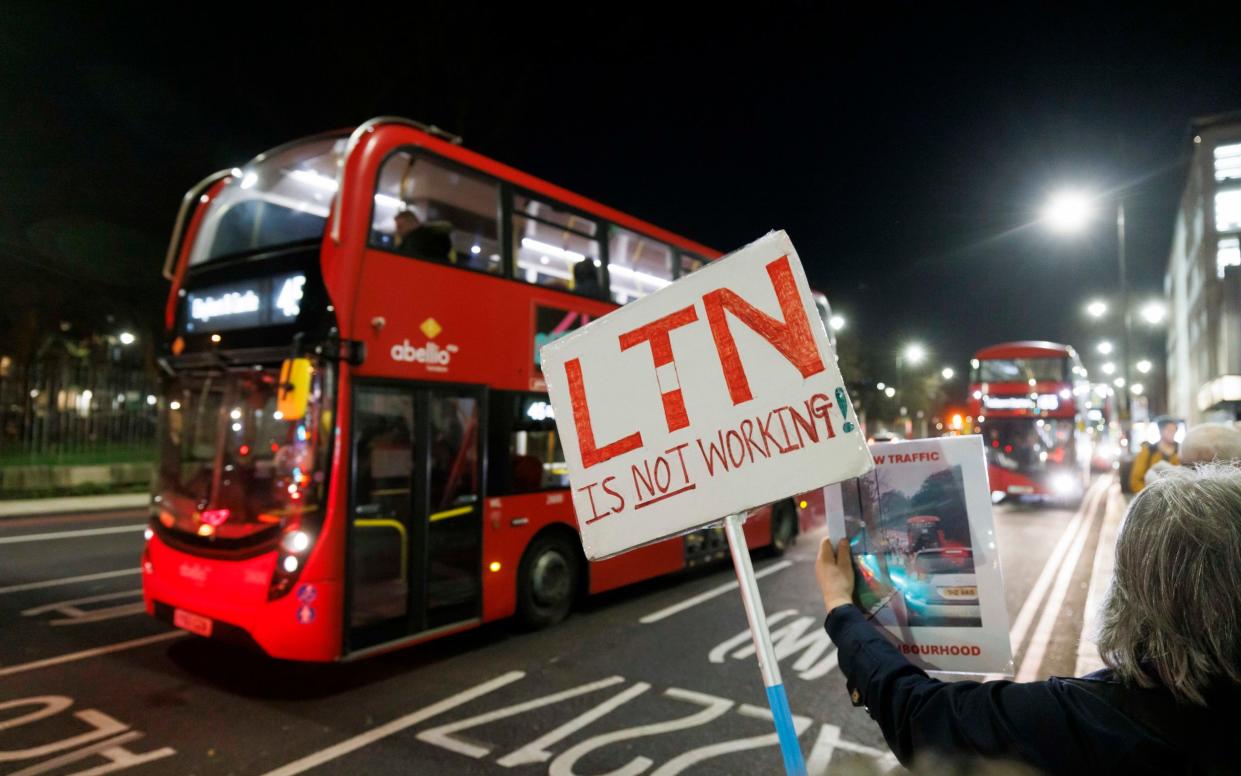LTN caused 30pc surge in pupils arriving late

A low-traffic neighbourhood that brought gridlock to public transport caused a 30 per cent surge in school pupils arriving late as they navigated “heavy traffic and fumes”, a headteacher has revealed.
The headteacher at Julian’s Primary School in Streatham has said parents and teachers were so worried about “health implications” caused by road closures funnelling traffic onto boundary routes that some considered “moving out of the area”.
The comments about the Streatham Wells LTN introduced by Labour-run Lambeth council in October have emerged in response to a series of Freedom of Information requests to the school.
Sam Linton, the Head of School, said that in the seven weeks before the LTN was introduced 554 pupils arrived late. But over a six-week period after the LTN was set up there were 717 late arrivals.
She wrote: “So one less week but over 150 more late arrivals.”
Ms Linton said teachers “stood at the schoolgate every morning and at the end of the day and would see how congested the road was, with traffic often stopped outside the school, particularly during busy periods for the school”.
She added: “The children would have to navigate through this heavy traffic and fumes to enter the school.
“Parents/carers would raise their concerns about the health implications and discuss the possibilities of moving out of the area.”
She said the LTN had caused such stress to teachers struggling to get to work that “some staff have been looking outside of London for teaching posts.”
The Telegraph has revealed how a headteacher at nearby Bishop Thomas Grant School said teachers ran patrols after a surge in muggings of pupils on “ghost town” streets created by the LTN.
Although Lambeth council suspended the LTN in March over concerns public transport had been affected, campaigners now insist it should be banned completely.
Public transport was found to have ground to a near halt on the A23, a main artery out of south London.
‘LTN impacted staff attendance’
Ms Linton wrote that the main road was “gridlocked [and] air quality was definitely negatively affected by the LTN.”
She added: “The LTN significantly impacted on staff attendance and punctuality. This then had a knock-on effect of ensuring that staff were available to cover classrooms until their teacher arrived in school as they would often not arrive until after the start of the school day.”
Ms Linton said the council’s consultation process was “limited”, adding that a planned meeting in 2022 was “not very well attended” because of a “lack of advertising by the borough”.
She said Cllr Rezina Chowdhury, Lambeth’s cabinet member for clean air, “did not turn up” to a meeting about the LTN amid concerns parents were angry about the scheme. Instead, she went to another school and released a “pro-LTN film”, Ms Linton said.
The council wrote to Ms Linton, urging her not to “broadly circulate” details of another meeting to avoid the session “circulating on social networks”.
Ms Chowdhury failed to respond to a request for a comment.
The Telegraph also revealed Lambeth had issued a record £50 million in fines to motorists after introducing seven controversial LTNs since the council embraced the Tory LTN policy in 2020.
‘Lucrative greenwash’
Sheila O’Reilly, who submitted the Freedom of Information request, said: “Lambeth couldn’t care less about schools or post-Covid-era stressed teenagers and teachers trying to return to structure and routine or parents trying to organise work, life and children.
“If Lambeth is content to throw whole communities under a bus to serve a very lucrative greenwash then shame on them.”
A Lambeth council spokesman said the LTN was introduced “to reduce road danger and make the neighbourhood safer and healthier” and the community and schools were “fully engaged”.
He added: “During the planning for, and when in place, we carried out lots of school and nursery visits to discuss the trial LTN. That included six school visits by our cabinet lead and offers of more visits to other schools in Streatham.
“Local ward councillors from the council also talked with schools in the area about the trial.
“The investments that TfL and the council are making on the A23, and the Streatham to Peckham healthy route, will set the conditions for future changes to make Streatham a clean, vibrant and climate resilient place where people can lead healthier, happier lives.”


